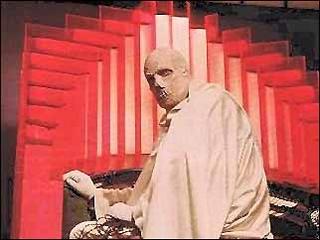beta eyes without a face

Not quite realizing it, I picked out a double feature in the form of Vincent Price's centennial feature film, The Abominable Dr. Phibes and Georges Franju's Les Yeux Sans Visage ("Eyes Without a Face" for the Billy Idol-obsessed). Both are classics (prob'ly why the NYPL carries 'em), either of the cheese or realistic chill variety. Won't spend much time lamenting how CGI has scrubbed clean horror backdrops even as they made them more 'scary' and dungeon-drippy, so that once-campy but kaleidoscopic vision of set design and costuming has fallen haplessly deep into muted earth-tones and realistically drab monochromes, to where either in the deranged and ornate dwellings of the revenge-bent Dr. Phibes or else the ensconced black and white laboratory of Dr. Génessier, the films still shudder with wide-eyed horror in the present.
Both movies deal with that peculiar horror of being faceless, to where interacting with society is all but impossible and life of any import is dead even while they still 'live'. Too hideous are the visages of Dr. Phibes and the disfigured daughter of Dr. Génessier, Louise, each burned to the point of losing that most-individualistic of human traits, their face. Now obviously, horror excels when it can best magnify the dread of the everyday into something truly monstrous, be it the cave-day dread of untrackable squeaks, of being lost in the woods, of not being able to run fast enough, of the dark, but being marred beyond recognizability is a frightening prospect that even in a casual viewer causes tremors to the core. The infamous scene wherein Génessier slowly fillets and peels the face off of a young girl is still stomach-turning some forty years on.
Beyond mere parallel plot points, the engine of both men's vengeance is of a rationalized sort of madness, gripping both doctors as they try to atone for accidents beyond their professional grasps. Being doctors (Phibes was also a masterful organist, making him prone to brooding meditations on his glowing ruby pipe organ in-between murders and the winding up of his inflatable jazz band, Dr. Phibes and his Clockwork Wizards) both men are used to controlling both life and death, of being all-powerful, able to save lives, especially their beloved, to exert their wills against all odds. So whether its Phibes' inability to save his wife from a car accident death or Génessier's helplessness in the disfigurement of his own daughter from such a car fire, both men are fueled by a desire to eradicate their mistakes, their own feebleness, by muuuuuuurder.
Phibes is the classic madman, hiding in a castle of some sort, taking the lives of the nine surgeons who were unable to save his young wife on the operating table in twisted variations of the plagues of the Pharoahs. There's a contraption to replicate hail inside a car, a birdcage full of bats, a brussel sprout syrup that makes locusts eat the face off a nurse, a fat Hebrew neckpiece to correspond to each death, for no other reason than to copycat such poetic pestilence nine times. Believe me, it's far easier to create wax busts for each victim, get the special necklaces made, and then melt each face after death than to be prostrate in the face of unyielding fate and admit that your wife is dead and there's little you can do about it.

What makes Dr. Génessier, as Georges Franju tells in an interview, so frightening is that he is someone quite rational behaving irrationally. He's delivering a paper on skin grafts, he's running a clinic successfully, he's taking in stray dogs, he's dealing with the traumatic 'loss' of his daughter by immersing himself in his life-saving work. Such realism made me wonder through most of the film if this might have been a real case after all. Rather than accept his error (the car accident is mentioned as being his fault), his mistakes, his wrongheadness, admit that he's destroyed his daughter even while she still lives, he'd sooner take to kidnapping and performing horrific operations on both young girls and lost dogs, heedless of the consequences or his own daughter's feelings or his own certain yet spiraling madness, and spend forever just trying to mask his own mistakes.

0 Comments:
Post a Comment
<< Home